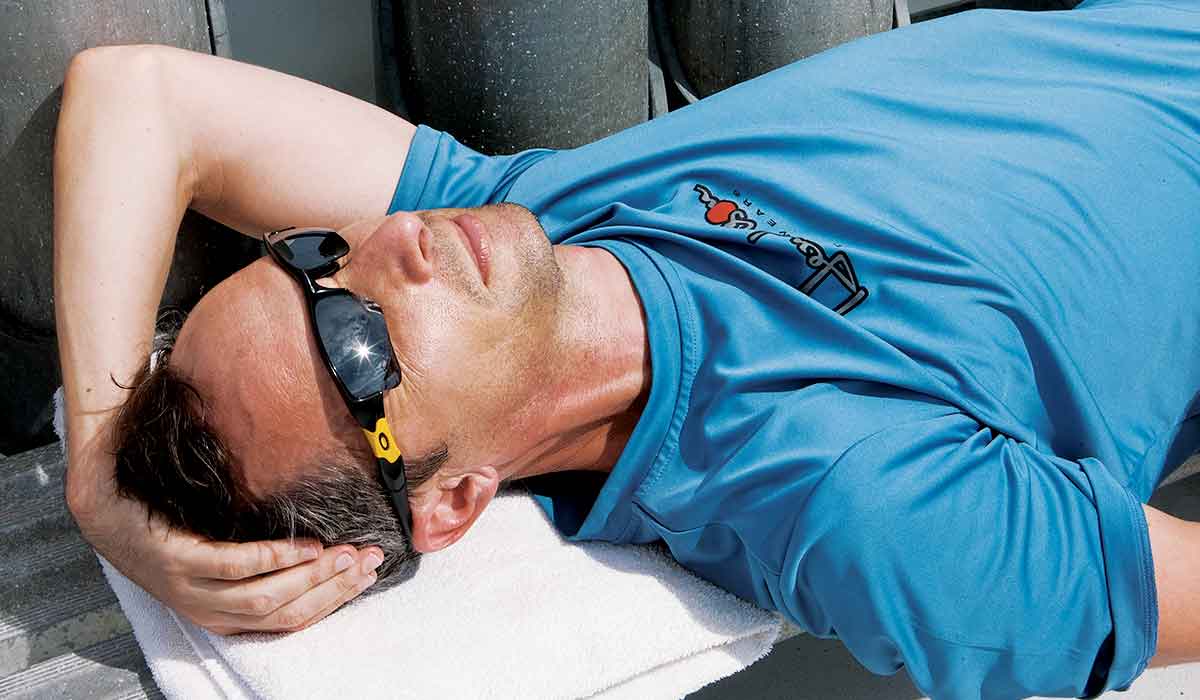2 1/2 years ago I summarized the most-quoted existing research on Nitrox and post-dive fatigue, which at that time was inconclusive mainly for two reasons: (1`) differing definitions of "fatigue" by divers and researchers, and (2) studies that looked at single dives or chamber dives rather than repetitive in-water dives. Aside from various criticisms of methodology and statistical significance, no real conclusions could be drawn at that time. Meanwhile, the anecdotal evidence for lessened fatigue continues to accumulate...
One of the interesting parts of that 6-page thread (disregarding the off-topic diversion about goats) was the suggestion that any perceived 'lessened fatigue)" was
not related to the increased O2 in Nitrox, but rather to the lessened N2. In other words, the farther away you are from your NDL on a dive, the better you might feel afterward. Since Nitrox allows you to stay farther away from your NDL -- all other things being equal -- then the apparent lessened fatigue might be just because you have less sub-clinical DCS.
The critical references used in the DAN summaries are:
Chapman SD, Plato PA. Measurement of fatigue following 18 msw open-water dives breathing air or EAN36. In: Brueggeman P, Pollock NW, eds. Diving for Science 2008. Proceedings of the American Academy of Underwater Sciences 27th Symposium, 2008; 1-11.
This publication is based on a 2007 Master's Thesis, available
here.
Harris RJD, Doolette DJ, Wilkinson DC, Williams DJ. Measurement of fatigue following 18 msw dry chamber dives breathing air on enriched air nitrox. Undersea Hyperb Med. 2003; 30(4): 285-91.
Lafère P, Balestra C, Hemelryck W, Donda N, Sakr A, Taher A, Marroni S, Germonpré P. Evaluation of critical flicker fusion frequency and perceived fatigue in divers after air and enriched air nitrox diving. Diving Hyperb Med. 2010 September; 40(3): 114-8.
The DAN article that summarizes this work is mainly an interview with Harris and Doolette:
Is there any solid evidence to support the observation that nitrox reduces fatigue? The experts weigh in on the intersection of air, nitrox and fatigue.

dan.org
That article asks, and Harris and Doolette respond:
Are there any reliable data to support claims about nitrox causing less postdive tiredness than air?
Harris: No. Three articles in the peer-reviewed literature (see the first three in the references sidebar) contribute evidence to the nitrox and fatigue question, but I am not convinced that the size and power of any of them have addressed the problem comprehensively.
Pollock: The data supporting these claims are not compelling. This is not surprising since PO2 increases substantially in response to depth alone. However, there is no reason to argue over whether a person feels less fatigued. Research has shown that the placebo effect has physiological impact, so let the diver enjoy the sense. The important thing is for divers to stay within the PO2 limits to avoid oxygen toxicity.
Further, on the issue of sub-clincal DCS, they say:
Would you consider tiredness/fatigue a sign of subclinical DCS?
Harris: I believe that fatigue can be a symptom of DCS, but it needs to be something very marked to impress me. Severe fatigue, such as feeling like you have the flu rather than just being “a bit more tired than usual after diving,” is a more serious issue. Rather than use the term subclinical DCS, which I do not favor, I would only call fatigue DCS if it is part of a constellation of symptoms.
Pollock: Normal patterns of postdive tiredness would not qualify, but “unusual fatigue” markedly in excess of typical levels could be a sign or more likely a symptom. Having the diver describe the nature and degree of the effect is important to help distinguish normal from unusual.
Despite a common impression that diving on nitrox may cause less fatigue than performing the same dive using an air mixture, scientific research to date has not found solid evidence to support such an assumption. As mentioned, the placebo effect should not be underestimated and has yet to be fully studied.
No new relevant studies that I can find have been published since those old ones, except for
this one:
Fabian Möller , Elena Jacobi , Uwe Hoffmann , Thomas Muth , Jochen D. Schipke. Oxygen-enriched Air Decreases Ventilation during High-intensity Fin-swimming Underwater. Int J Sports Med 2022; 43(03): 230-236.
Möller et all see a significant decrease in ventilation during strong swimming for divers using enriched air, suggesting there is more going on with Nitrox than just decreased N2 uptake.
Caveat: there are many blogs and books and manuals and divers and instructors and agencies that say enriched air has no effect on fatigue, or that it reduces fatigue. If they give any citations at all, it is usually either the Harris article from 2003 or the DAN summary from 2014, in which Harris disavows his 2003 article as really addressing the issue.
The question is still open.





